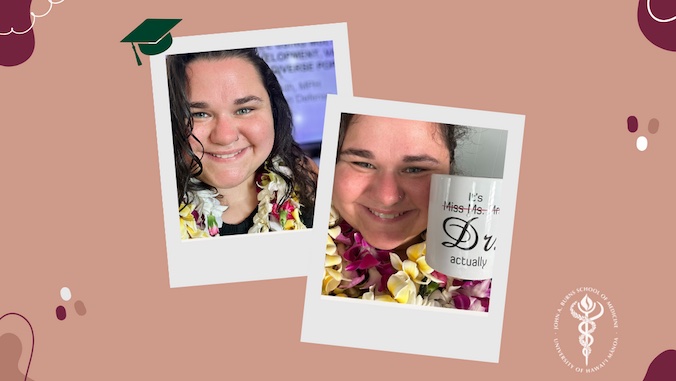
Growing up, Olivia Smith, a recent PhD graduate from the University of Hawaiʻi at Mānoa John A. Burns School of Medicine (JABSOM) had always thought her future career would involve medicine. However, while pursuing her bachelor’s degree in neuroscience at the University of Vermont, she realized that she preferred her time at the lab bench and in the field, absorbed in the world of research.
“I thought to myself, ‘oh I really like this.’ I like finding out these intricate pathways and things that make up these evidence-based practices that we can use in the real world,” said Smith, who earned her degree in tropical medicine, medical microbiology and pharmacology at the fall 2023 commencement.
Smith spent two years with the Peace Corps in Peru as a water, sanitation and hygiene educator, pursued a master’s of public health in epidemiology from the University of Massachusetts Lowell, then began her PhD program at JABSOM, just as the COVID-19 pandemic began to take its toll in the U.S.
“The pandemic was quite memorable but I’m really happy with the time I’ve had here. Even though the pandemic definitely hindered it a little—it definitely directed my research and not in a bad way,” said Smith, who successfully defended her dissertation, “Assessing Vaccine Efficacy and Seroprevalence Using Multiplex Immunoassays: Development, Validation, and Applications in Diverse Populations,” in November.
Smith’s research involved three parts, including the development of a tool that detects antibody levels after given a vaccine. This can indicate how effective a vaccine is and how well it works in various groups of people, even those with different health conditions. After analyzing the response to COVID-19 vaccines using these MIAs, she found that comorbidities (diseases or medical conditions that are present simultaneously), such as obesity and diabetes, reduce vaccine efficacy.
Opening the doors for future research
Smith, who was mentored under Associate Professor Axel Lehrer, is hopeful that the results may open the door for future research that perhaps studies specifically-tailored vaccines for those with comorbidities.
“It’s not to say that people with obesity and diabetes shouldn’t get vaccinated, if anything it’s the exact opposite—they should be vaccinated, 100%, because people with these comorbid conditions are more susceptible to severe disease,” Smith said.
With the knowledge gained at JABSOM, Smith is heading back home to Massachusetts with aspirations to do fieldwork in the realm of global public health. Her life experiences and her research have shown her how vaccines can be a great prevention method that can lead to her dream of achieving health equity for all.
“I’m a big advocate for health equity. I think health is a human right. Everyone deserves (good) health,” said Smith.
Read more on the JABSOM website.

